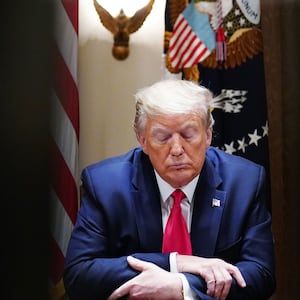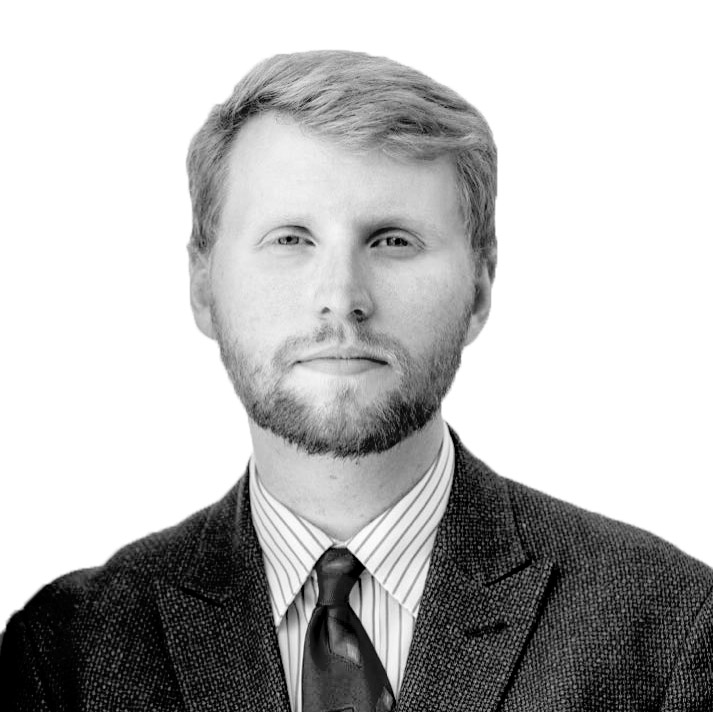If an economic recovery task force is composed of members who didn’t know they’d been placed on it, does it really exist?
That’s the question President Donald Trump confronts a day after he and his staff announced a lengthy list of business heavyweights, labor leaders, celebrities, informal Trump advisers, “thought leaders,” and defense contractors who, they implied, would be working in conjunction with the president to nudge the country back to work in the face of a rising body count, a crashing economy, and public-health officials and governors’ dire warnings.
Trump proudly touted his “Great American Economic Revival Industry Groups” during a White House press briefing in the Rose Garden on Tuesday night. And yet, many of the listed names and companies did not learn of their new, supposed advisory roles until the president read their names on live TV, or until after the White House published the full list. Others said they hadn’t even committed to working with the Trump administration on this, and only agreed to take a phone call from the White House to see if the effort was worthwhile or just for show.
It turns out it was the latter. Kind of. Less than 24 hours later, it had become clear that industry groups were mainly being used as a sounding board, with some leaders even encouraging the president to not abandon public safety policy for the sake of an economic activity sugar rush. Meanwhile, Bloomberg reported that Trump was abandoning the idea of creating an in-house council of White House aides and advisers, though officials cautioned that such a proposal had never been formally announced.
The chaos had all the hallmarks of a half-baked Trump administration idea: A flashy rollout, with almost no, even rudimentary, pre-planning or execution.
For example, one of the White House’s closest outside economic advisers says he wasn’t given a heads up and only learned of his inclusion on the “Great American Economic Revival Industry Groups” list when friends started calling him to ask him if he’d heard what Trump had just said at his briefing. In fact, of the 20 The Daily Beast contacted, only two were able to definitively say they weren’t caught off-guard by their inclusion, one of whom was the Shark Tank reality-TV star and Dallas Mavericks owner Mark Cuban, who had campaigned for Hillary Clinton in 2016 and once publicly denounced Trump as a “jagoff.”
Some of the “thought leaders” listed by Trump and the White House didn’t even want the new council to be based in the West Wing to begin with.
“I was sort of surprised at the shape [it had] taken,” Stephen Moore, a Heritage Foundation economist who informally advises President Trump and his administration, said on Tuesday. “I have great respect for all the people in the White House, but what we’d been advising [the Trump administration] was an idea of a task force that was outside and independent of the White House, providing economic ideas in an advisory capacity.”
Art Laffer, another longtime conservative economist who has for years counseled Trump and administration brass, said in a brief interview on Wednesday morning that he was not informed ahead of time that he’d been assigned this advisory position. “I was not watching TV at the time,” he said, of the Rose Garden briefing. “I found out about it [yesterday] when three to five friends started calling me to ask me about it.”
The Trump ally said he’d received no further guidance on the matter, either “directly or indirectly” from the White House, except that he knew there was a White House conference call he was supposed to get on “today or tomorrow.” (The Daily Beast informed Laffer that the call was scheduled for Wednesday afternoon.) “I am very pleased to be named on the list, and any way I can be helpful [I will],” Laffer added.
Richard Trumka, the president of the AFL-CIO, the biggest federation of American unions, was also namechecked by President Trump on Tuesday. The labor group hadn’t gotten the memo, either.
Tim Schlittner, AFL-CIO communications director, told The Daily Beast that “we’d first learned [about this] from the announcement in the Rose Garden last night.” Schlittner said AFL-CIO staff also received “what appeared to be a mass email with instructions to RSVP" for a Wednesday conference call, hosted by Trump, with industry and labor organizations.
“There was no call from President Trump to President Trumka on this,” he said. “President Trumka is calling in to see if this is a serious effort or not.”
Spokespeople and officials at various other groups and corporations also said that they were given no advance warning that their alleged participation was going to be publicly rolled out and, as such, took a more diplomatic approach to the White House on Wednesday. A spokesperson for the International Brotherhood of Teamsters declined to comment when asked if Teamsters General President Jim Hoffa or the organization knew about his inclusion before the announcement.
A spokesperson with the National Association of Home Builders said in an email “that everyone knew a list was being created, and we were hoping to be on it.”
“We didn’t know for sure that we would be part of it until just before the president spoke yesterday on this,” the spokesperson said. “It is not surprising though that we were included, as we have had a positive relationship with the Administration and work together regularly to ensure housing is at the forefront of the recovery.”
For whatever reason, it was Mark Cuban, the celebrity billionaire who got one of the clearest heads-up from the Trump administration that he’d be on the new group of advisers. On Tuesday evening, Cuban told The Daily Beast that he will be working with the “opening our country” council in an “advisory” role. “I’m absolutely looking forward to trying to help,” he said, adding that the White House had recently reached out to him to ask if he’d take the position, to which he agreed. (Late last week, Cuban had appeared on Fox News, and the host Brian Kilmeade mentioned that President Trump could be watching, and therefore could likely contact Cuban to join the council.) Asked who he spoke to in the White House, Cuban said, “I didn’t even get their name.”
While he didn’t get a name, Cuban was just one of the lucky ones who appear to have enjoyed some advance warning. Rachel O’Grady, director of media relations for the Associated Builders and Contractors said in an email the organization “did receive the invitation before the press briefing.”
Despite the lack of advance warning, Trump spent much of his Wednesday talking to different sets of these “Economic Revival” groups, with multiple conference calls, each lasting for more than an hour. During a noon call that included tech and telecommunications giants, the president spoke with industry leaders such as Apple’s Tim Cook and Facebook’s Mark Zuckerberg, according to a source familiar with the conversations. The president and participants discussed coronavirus testing and options for “re-opening” the U.S. economy. A 2 p.m. discussion hosted by Trump featuring various “thought leaders” included Trump allies such as Laffer and Moore.
“President Trump, who has already brought together the private sector and federal government for unprecedented collaboration during the COVID-19 pandemic, is beginning a dialogue with prominent and successful individuals across multiple industries with different backgrounds and skill sets for the monumental task of re-opening the American economy,” White House spokesman Judd Deere wrote in a statement. “President Trump’s policies built a booming economy and they will do so again.”
The council had been viewed in the West Wing as an explicit counterweight to the virus task force and Trump’s top public-health officials, including doctors Deborah Birx and Anthony Fauci, who have generally advocated a slower, less optimistic approach to how and when the country should return to a semblance of normalcy.
The prospect of the new council—which is now, apparently, non-existent once more—had provoked consternation among officials working closely with the task force, who are concerned that their advice could be brushed aside by the president in favor of a hastier approach that they believe would result in a viral relapse.
“There are some of us who are confused about what the point of [the council] even is,” said a U.S. official working with the task force. “What is the point of this if not to manufacture a rosier picture for the president to cite when he starts telling people it’s okay to go back out… when it might not be?”











